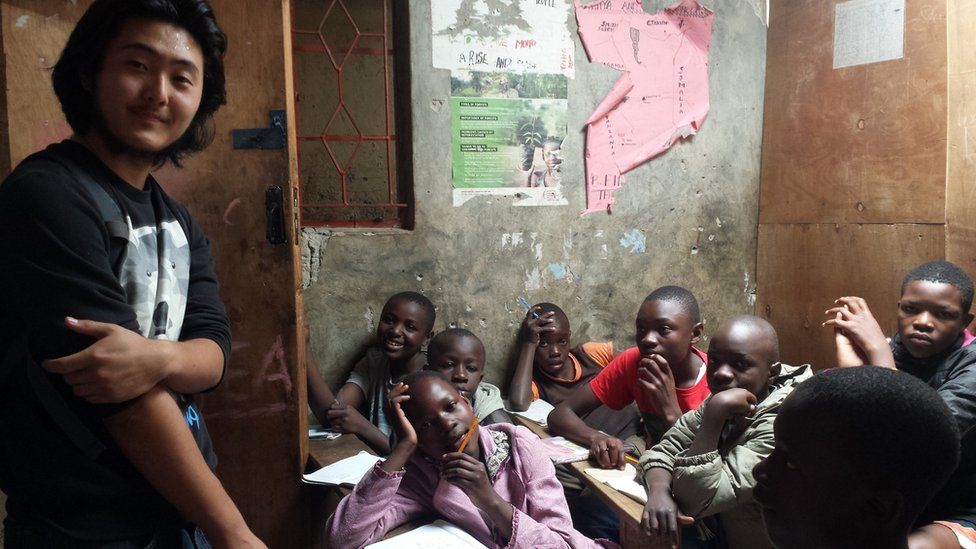Teaching Mandarin: Chinese influence in Kenya’s slums
- Published

"Ni hao!" a group of Kenyan schoolchildren call in unison as they bound uphill towards a wooden hut perched on the hill ahead.
"Those are some of my new students," teacher Liu Yimenghan tells me, smiling broadly. "Chinese is their favourite class."
The Chang Rong Light Centre in Kenya's Mathare slums is a 15-minute drive from the centre of Nairobi, but it feels like a world away. Kiosks nearby sell Chinese colouring books, dim sum bubbles on hot stoves and schoolchildren carry canvas book bags from Beijing.
It's here, among some of Kenya's poorest communities, that Chinese companies are investing heavily, building roads and residential blocks. Many are now turning to education, developing programmes to teach Mandarin to at-risk young people on the outskirts of the capital city.
"It's a way to understand a different culture. As well as learning a new language, we also teach them about our way of life," Liu explains. "Next year, we hope to bring Kenyan children to China so they can practise their Mandarin there."
Heightened tensions
Among the local community, there is some scepticism about the motivation for Chinese investment in educational programmes.
Some of Mathare's residents believe that they are seeking to create dependence rather than supporting the development of Nairobi's slum areas, which has led to heightened tensions in recent months.
Arting Luo from the Sino-Africa Centre of Excellence, a think tank, says this is an unjust representation of Chinese intentions.
"Chinese companies often come under scrutiny that they are international land grabbers," she says. "There is a lot of misperception about our business interests. And there are a number of institutional factors, such as corruption, which have made communication with the communities here more difficult."
But, she acknowledges, there is more that Chinese companies can do to improve their interactions with local communities.
"If they can be more open-minded and talk to a wider group of stakeholders, they will be able to achieve better community relations."
Chinese ownership
At a local market close to the Chang Rong Light Centre, I met Martin, a bus ticket collector, whose kiosk is sandwiched between two vegetable stalls run by Chinese owners. He tells me he has recently switched to this job following an altercation with other Chinese entrepreneurs.
"They demolished my shop without any warning," he explains. "They wanted to take the land to build, but they didn't ask me. They just came and destroyed my shop and ruined my business. Now I have to work on the buses."
In response to Martin's claim of appropriation of Kenyan land, the China Road and Bridge Corporation, the body responsible for China's private sector contracts in East Africa, stated: "Land acquisition and facilities demolition are the employer's responsibility and, in most instances, the employer of infrastructure projects is the government."
Chinese companies now own 31% of infrastructure projects in Kenya, according to the consultancy firm Deloitte - a figure that rises to over 50% when considering construction and education programmes.
As Chinese investment increases, so too do tensions between foreign contractors and local workers.
Arting Luo from the Sino-Africa Centre of Excellence believes that training Kenyan construction workers will help to alleviate some of the pressure between the communities.
"We hope in the future that Kenyan trainees may become subcontractors for Chinese projects. Once they have the management skills and technical know-how, we may be able to outsource some of the construction work to small Kenyan enterprises."
Culture gap
With well over 40,000 Chinese people now living and working in Kenya, cultural and linguistic barriers are proving to be another major obstacle.
Lucy Liu from China House, a not-for-profit organisation that seeks to promote engagement between Chinese companies and Kenyan communities, says that overcoming these barriers will be essential.
"It is difficult to bridge the gap as the two cultures are so different, especially our ideas about boundaries and timeframes. We see other people from our own perspective, so it's sometimes hard to interact. Everybody needs a lot of patience."
Wildlife conservation is also a source of tension, Lucy says.
"The ivory trade has given China a bad image in Kenya, as we are still one of the biggest ivory markets in the world.
"Persuading Chinese communities here not to get involved is very complicated. We try to inform them about the Kenyan mentality around poaching and also to improve the image of Chinese people with local populations."
But for local businessmen like Martin, the arrival of Chinese companies in the Mathare slums has already had a significant impact.
"They don't want to help us. They are making a lot of money from Kenya. It's all for business."
Fro more on this story listen to World Business Report on BBC World Service.